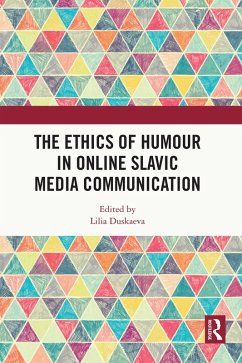The Ethics of Humour in Online Slavic Media Communication (eBook, ePUB)
Redaktion: Duskaeva, Lilia
41,95 €
41,95 €
inkl. MwSt.
Sofort per Download lieferbar

21 °P sammeln
41,95 €
Als Download kaufen

41,95 €
inkl. MwSt.
Sofort per Download lieferbar

21 °P sammeln
Jetzt verschenken
Alle Infos zum eBook verschenken
41,95 €
inkl. MwSt.
Sofort per Download lieferbar
Alle Infos zum eBook verschenken

21 °P sammeln
The Ethics of Humour in Online Slavic Media Communication (eBook, ePUB)
Redaktion: Duskaeva, Lilia
- Format: ePub
- Merkliste
- Auf die Merkliste
- Bewerten Bewerten
- Teilen
- Produkt teilen
- Produkterinnerung
- Produkterinnerung

Bitte loggen Sie sich zunächst in Ihr Kundenkonto ein oder registrieren Sie sich bei
bücher.de, um das eBook-Abo tolino select nutzen zu können.
Hier können Sie sich einloggen
Hier können Sie sich einloggen
Sie sind bereits eingeloggt. Klicken Sie auf 2. tolino select Abo, um fortzufahren.

Bitte loggen Sie sich zunächst in Ihr Kundenkonto ein oder registrieren Sie sich bei bücher.de, um das eBook-Abo tolino select nutzen zu können.
The Ethics of Humour in Online Slavic Media Communication is devoted to speech research on how the rules of humour used online media are changing, and how these changes rearrange the traditions of speech interaction in media communication.
- Geräte: eReader
- mit Kopierschutz
- eBook Hilfe
Andere Kunden interessierten sich auch für
![The Ethics of Humour in Online Slavic Media Communication (eBook, PDF) The Ethics of Humour in Online Slavic Media Communication (eBook, PDF)]() The Ethics of Humour in Online Slavic Media Communication (eBook, PDF)41,95 €
The Ethics of Humour in Online Slavic Media Communication (eBook, PDF)41,95 €![Translation in the Digital Age (eBook, ePUB) Translation in the Digital Age (eBook, ePUB)]() Michael CroninTranslation in the Digital Age (eBook, ePUB)45,95 €
Michael CroninTranslation in the Digital Age (eBook, ePUB)45,95 €![Media, Culture, and Debate in Korean ¿¿¿, ¿¿, ¿¿¿ ¿¿ ¿¿ ¿¿¿ ¿¿ (eBook, ePUB) Media, Culture, and Debate in Korean ¿¿¿, ¿¿, ¿¿¿ ¿¿ ¿¿ ¿¿¿ ¿¿ (eBook, ePUB)]() Seung-Eun ChangMedia, Culture, and Debate in Korean ¿¿¿, ¿¿, ¿¿¿ ¿¿ ¿¿ ¿¿¿ ¿¿ (eBook, ePUB)37,95 €
Seung-Eun ChangMedia, Culture, and Debate in Korean ¿¿¿, ¿¿, ¿¿¿ ¿¿ ¿¿ ¿¿¿ ¿¿ (eBook, ePUB)37,95 €![A Discourse Analysis of News Translation in China (eBook, ePUB) A Discourse Analysis of News Translation in China (eBook, ePUB)]() Liang XiaA Discourse Analysis of News Translation in China (eBook, ePUB)42,95 €
Liang XiaA Discourse Analysis of News Translation in China (eBook, ePUB)42,95 €![Re-contextualising East Central European History (eBook, ePUB) Re-contextualising East Central European History (eBook, ePUB)]() Robert PyrahRe-contextualising East Central European History (eBook, ePUB)42,95 €
Robert PyrahRe-contextualising East Central European History (eBook, ePUB)42,95 €![The Routledge Handbook of Language and Media (eBook, ePUB) The Routledge Handbook of Language and Media (eBook, ePUB)]() The Routledge Handbook of Language and Media (eBook, ePUB)45,95 €
The Routledge Handbook of Language and Media (eBook, ePUB)45,95 €![Language, Media and Culture (eBook, ePUB) Language, Media and Culture (eBook, ePUB)]() Martin MontgomeryLanguage, Media and Culture (eBook, ePUB)29,95 €
Martin MontgomeryLanguage, Media and Culture (eBook, ePUB)29,95 €-
-
-
The Ethics of Humour in Online Slavic Media Communication is devoted to speech research on how the rules of humour used online media are changing, and how these changes rearrange the traditions of speech interaction in media communication.
Dieser Download kann aus rechtlichen Gründen nur mit Rechnungsadresse in A, B, BG, CY, CZ, D, DK, EW, E, FIN, F, GR, HR, H, IRL, I, LT, L, LR, M, NL, PL, P, R, S, SLO, SK ausgeliefert werden.
Produktdetails
- Produktdetails
- Verlag: Taylor & Francis
- Seitenzahl: 180
- Erscheinungstermin: 29. Dezember 2021
- Englisch
- ISBN-13: 9781000528220
- Artikelnr.: 63023194
- Verlag: Taylor & Francis
- Seitenzahl: 180
- Erscheinungstermin: 29. Dezember 2021
- Englisch
- ISBN-13: 9781000528220
- Artikelnr.: 63023194
- Herstellerkennzeichnung Die Herstellerinformationen sind derzeit nicht verfügbar.
Lilia Duskaeva is a Professor in the School of Journalism and Mass Communications, Head of the Department of Media Linguistics at St. Petersburg State University, Head of the Media Linguistical Commission under the International Committee of Slavists (under UNESCO patronage), Honored Professor of the Beijing Second Foreign Language University, and Chief Editor of the international scientific journal Media Linguistics. She has published nearly 300 academic publications on linguopragmatics, functional stylistics, and media linguistics.
Introduction; Chapter 1. Theoretical Framework for the Analysis of the Ethics of Humour in Mass Media Discourse (Lilia Duskaeva); Chapter 2. Multimodality of Internet-Mediated Communication Behaviour (Danuta K
pa-Figura); Part I. Ethical Evaluation of Humour in Mass Media; Chapter 3. Humour as Mockery (Lilia Duskaeva, Ksenia Shilikhina); Chapter 4. Humour in Prank Telephone Conversations (Lilia Duskaeva, Ekaterina Shcheglova); Chapter 5. Humour as Izdevka (Gibe) (Lilia Duskaeva, Liubov Ivanova); Chapter 6. Humour as Evaluation of Poshlost' and Cynicism in the Speech of Others (Viktoria Vasileva); Part II. Ethics of Online Humour in Slavic-Language Computer-Mediated Verbal Interaction; Chapter 7. Humour as a Provocation of Kpina (Mockery) and Wyszydzanie (Derision) in the Polish Political Segment of Twitter(Bogumi
Gasek); Chapter 8. Humour as Zdzek in the Verbal Behaviour of the Participants of the Belarusian-Language Online Community (
amara Pivavarchyk, Ina Minchuk); Chapter 9. Utipänost' and Correctness in Slovak Online Humour (Nina Cingerová, Irina Dulebová); Chapter 10. Humour of Solidarity in Russian-Speaking Discourse on Social Networking Groups in Lithuania (Anastasija Belovodskaja, Julija Korostenskien
); Concluding Remarks: Results of the Study (Lilia Duskaeva)
pa-Figura); Part I. Ethical Evaluation of Humour in Mass Media; Chapter 3. Humour as Mockery (Lilia Duskaeva, Ksenia Shilikhina); Chapter 4. Humour in Prank Telephone Conversations (Lilia Duskaeva, Ekaterina Shcheglova); Chapter 5. Humour as Izdevka (Gibe) (Lilia Duskaeva, Liubov Ivanova); Chapter 6. Humour as Evaluation of Poshlost' and Cynicism in the Speech of Others (Viktoria Vasileva); Part II. Ethics of Online Humour in Slavic-Language Computer-Mediated Verbal Interaction; Chapter 7. Humour as a Provocation of Kpina (Mockery) and Wyszydzanie (Derision) in the Polish Political Segment of Twitter(Bogumi
Gasek); Chapter 8. Humour as Zdzek in the Verbal Behaviour of the Participants of the Belarusian-Language Online Community (
amara Pivavarchyk, Ina Minchuk); Chapter 9. Utipänost' and Correctness in Slovak Online Humour (Nina Cingerová, Irina Dulebová); Chapter 10. Humour of Solidarity in Russian-Speaking Discourse on Social Networking Groups in Lithuania (Anastasija Belovodskaja, Julija Korostenskien
); Concluding Remarks: Results of the Study (Lilia Duskaeva)
Introduction; Chapter 1. Theoretical Framework for the Analysis of the Ethics of Humour in Mass Media Discourse (Lilia Duskaeva); Chapter 2. Multimodality of Internet-Mediated Communication Behaviour (Danuta K
pa-Figura); Part I. Ethical Evaluation of Humour in Mass Media; Chapter 3. Humour as Mockery (Lilia Duskaeva, Ksenia Shilikhina); Chapter 4. Humour in Prank Telephone Conversations (Lilia Duskaeva, Ekaterina Shcheglova); Chapter 5. Humour as Izdevka (Gibe) (Lilia Duskaeva, Liubov Ivanova); Chapter 6. Humour as Evaluation of Poshlost' and Cynicism in the Speech of Others (Viktoria Vasileva); Part II. Ethics of Online Humour in Slavic-Language Computer-Mediated Verbal Interaction; Chapter 7. Humour as a Provocation of Kpina (Mockery) and Wyszydzanie (Derision) in the Polish Political Segment of Twitter(Bogumi
Gasek); Chapter 8. Humour as Zdzek in the Verbal Behaviour of the Participants of the Belarusian-Language Online Community (
amara Pivavarchyk, Ina Minchuk); Chapter 9. Utipänost' and Correctness in Slovak Online Humour (Nina Cingerová, Irina Dulebová); Chapter 10. Humour of Solidarity in Russian-Speaking Discourse on Social Networking Groups in Lithuania (Anastasija Belovodskaja, Julija Korostenskien
); Concluding Remarks: Results of the Study (Lilia Duskaeva)
pa-Figura); Part I. Ethical Evaluation of Humour in Mass Media; Chapter 3. Humour as Mockery (Lilia Duskaeva, Ksenia Shilikhina); Chapter 4. Humour in Prank Telephone Conversations (Lilia Duskaeva, Ekaterina Shcheglova); Chapter 5. Humour as Izdevka (Gibe) (Lilia Duskaeva, Liubov Ivanova); Chapter 6. Humour as Evaluation of Poshlost' and Cynicism in the Speech of Others (Viktoria Vasileva); Part II. Ethics of Online Humour in Slavic-Language Computer-Mediated Verbal Interaction; Chapter 7. Humour as a Provocation of Kpina (Mockery) and Wyszydzanie (Derision) in the Polish Political Segment of Twitter(Bogumi
Gasek); Chapter 8. Humour as Zdzek in the Verbal Behaviour of the Participants of the Belarusian-Language Online Community (
amara Pivavarchyk, Ina Minchuk); Chapter 9. Utipänost' and Correctness in Slovak Online Humour (Nina Cingerová, Irina Dulebová); Chapter 10. Humour of Solidarity in Russian-Speaking Discourse on Social Networking Groups in Lithuania (Anastasija Belovodskaja, Julija Korostenskien
); Concluding Remarks: Results of the Study (Lilia Duskaeva)







